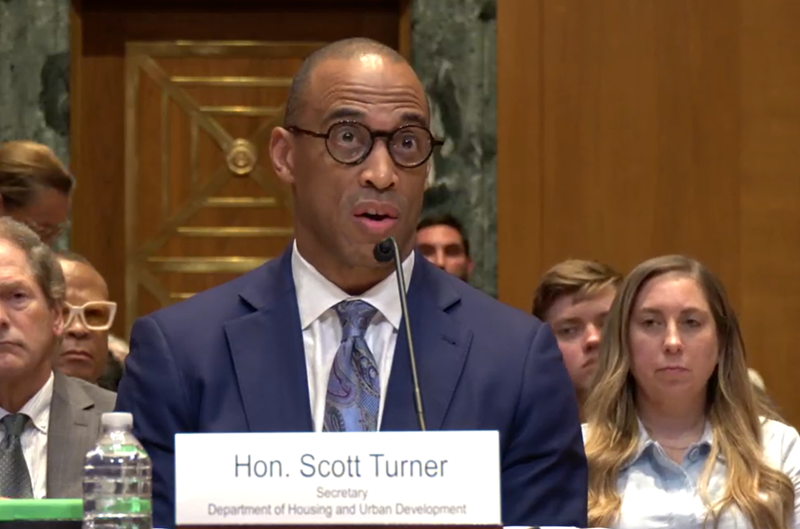Scott Turner, Secretary of the U.S. Department of Housing & Urban Development (HUD) recently appeared before the Senate Committee on Appropriations to testify in support of President Trump’s 2026 Budget for HUD.
President Trump’s FY 2026 Budget request includes a 44% reduction in funding for HUD, compared to 2025. The Trump administration feels this reduction can become a reality by consolidating HUD’s largest rental assistance programs and eliminating programs related to homelessness, community development, housing for Native communities, and fair housing.
“What better way to celebrate our country’s independence than getting @POTUS’ One Big Beautiful Bill signed into law on July 4th The One Big Beautiful Bill will give millions of Americans financial freedom and unleash America’s Golden Age,” said the HUD Secretary via a recent social media post.
The budget also includes reforms and cuts to housing programs administered by other federal agencies, putting more of a focus on states and state mandated programs to address housing needs.
“At HUD, we are taking inventory of every program and process,” said Secretary Turner before the Committee. “We started this mission on day one and are continuing to take inventory each and every day. What we have found is a rental assistance system full of waste, fraud, and abuse; inefficiencies and bloated administrative costs; deteriorating public housing units; and a rent structure that punishes work and marriage among residents. Simply put, it is a broken system that has deviated from its original and intended purpose–to temporarily help Americans in need.”
Specifically, Trump’s FY 2026 Discretionary Budget Request focuses on the following HUD-related housing initiatives:
- Community Development Block Grant (CDBG) Program: The Budget proposes to eliminate the CDBG program, which provides formula grants to more than 1,200 state and local governments for a wide range of community and economic development activities. Cutting the CDBG program will save an estimated $3.3 billion according to the Budget Request.
- HOME Investment Partnerships Program: The Budget seeks to eliminate the HOME program, a formula grant that provides state and local governments with funding to expand the supply of housing. Cutting the HOME program will save an estimated $1.25 billion annually.
- Native American Programs and Native Hawaiian Housing Block Grant: The FY 2026 Budget streamlines housing assistance for Native American programs and focusing available resources on the main formula grant to Tribes. Consistent with similar FY Budget proposals eliminating housing programs, the Native Hawaiian Housing Block Grant would be eliminating, saving approximately $480 million annually.
- Homeless Assistance Program Consolidations: The FY 2026 Budget consolidates the Continuum of Care and Housing Opportunities for Persons with AIDS programs into a more targeted Emergency Solutions Grant (ESG) program that provides short- and medium-term housing assistance, capped at two years, to homeless and at-risk individuals. Approximately $532 million would be saved by consolidating these homeless assistance programs.
- Surplus Lead Hazard Reduction and Healthy Homes Funding: This set of programs has unobligated balances that should be depleted prior to receiving further appropriations, and would save approximately $296 million annually if cuts are approved.
- HUD Self-Sufficiency Programs: HUD’s “Self-Sufficiency Programs” were designed to promote self-sufficiency among housing assistance recipients. Cutting these programs would save $196 million annually.
- Pathways to Removing Obstacles (PRO) Housing: Consistent with the Executive Order 14151, “Ending Radical and Wasteful Government DEI Programs and Preferencing,” the FY 2026 Budget proposes to eliminate PRO Housing, which was used by the Biden administration to advance equity through affordable housing development programs. Cutting PRO Housing from the FY 2026 Budget would save an approximate $100 million annually.
- Fair Housing Grants: The Budget looks to save $60 million annually through the elimination of the Fair Housing Initiatives Program (FHIP), which provides competitive grants to public and private fair housing organizations to advocate against single-family neighborhoods and promote radical equity policies. The Budget also seeks to eliminate the National Fair Housing Training Academy, which provides training for Fair Housing Assistance Program (FHAP) and FHIP professionals as well as funding to translate HUD materials to languages other than English.
Sen. Kirsten Gillibrand, Ranking Member of the Senate Appropriations Committee, discussed the collateral damage such budgetary cuts would have to the nation’s senior population and homelessness among seniors.
“The budget cuts homeless assistance by 13%, and you propose strict limits even for seniors,” said Sen. Gillibrand during the hearing. “Mr. Secretary, under your proposal, what happens to the seniors currently being served in supportive housing, and what’s your ambition to addressing homelessness amongst older Americans?”
Secretary Turner replied, “The language in the budget prioritizes seniors, the elderly, the disabled, and veterans, so we are well aware of this and at HUD, we will continue to prioritize our seniors.”
Senate Appropriations Committee Member Sen. Brian Schatz pressed the HUD Secretary about the regulatory barriers in place preventing affordable housing.
“We want to incentivize states and counties to unravel this labyrinth we created for ourselves,” said Sen. Schatz of the red tape involved in affordable housing.
Secretary Turner replied that HUD is taking inventory of regulations at the state and local level to identify problems and “do something about these problems.”
Click here for more on HUD Secretary Turner’s appearance before the Senate Appropriations Committee.







